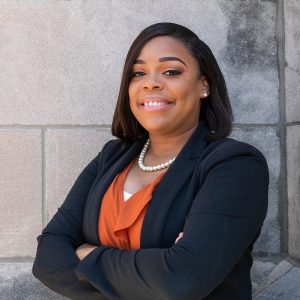Challenger takes on Davis for congressional seat
By Kevin Beese Staff Reporter — September 17, 2019Kina Collins says she may not top her Democratic primary opponent in fund-raising, but she will top him in organizing.
Collins is taking on longtime 7th District U.S. Rep. Danny Davis in next spring’s primary.
“There is definitely a distinction between us,” Collins said. “I am not taking corporate PAC (political action committee) money. I have raised $25,000. All of it, 100 percent, is from individual small donations. I have out-fund-raised him in individual small donations.
“Who funds your campaign is exactly who you are held accountable to and who you answer to. In order to win, you have to have organized people and organized money,” she said. “You don’t win with big money. You win with big organization, expanding and electrifying the electorate.”
Collins is a third-generation resident of Chicago’s Austin neighborhood. Growing up in the 7th District, Collins witnessed a homicide at 7 years of age. She has organized Chicago public school students and mobilized protests in the wake of Chicago police Officer Jason Van Dyke’s fatal shooting of teen Laquan McDonald. She co-authored the state’s Illinois Council on Women and Girls Act, which created a panel to advise the governor and state lawmakers on issues concerning females.
“I’m battle-tested so I decided to throw my hat in the ring,” Collins said.
The 28-year-old Chicago resident said that Davis has been the 7th District congressman nearly her entire life and that it’s time for a change.
Unlike recent Davis challengers who ran as Republicans in the bluest (Democratic) district in the state and fourth or fifth most Democratic district in the whole country, Collins will take Davis on in the
Democratic primary.
“The whole Democratic Party is elevating new leadership in the party,” Collins said. “We have an urgent crisis in the nation and the 7th District with gun violence, climate change and justice reform. It’s time for us to aggressively come after things with solutions. I don’t think voters feel there is a sense of urgency on things in the 7th District … . We should be serving as a national model. We need to push a progressive agenda. Voters do not feel that is happening.”
Collins said she is an expert on her community, having lived there her entire life
“It is one of the most marginalized districts in the country,” Collins said of the 7th District.
She said that voters are looking for new faces and new voices.
“Not just here but across the country, people want political outsiders, individuals who are not afraid of being held accountable by voters,” Collins said.
Collins is ready to discuss the 7th District’s pressing issues before voters and expects Davis to address the issues in forums with her.
“The district is extremely Democratic,” Collins said. “The primary will give us the ability to debate issues in front of constituents to see what direction they want us to go in. Voters are smart enough to see who they want to represent them. People don’t give voters enough credit,”
She said the 7th District is extremely unique with a lot of economic diversity. She said gun violence is one issue that needs to be addressed on behalf of the district, the most violent area of the state.
“We have to absolutely tackle gun violence,” Collins said. “I will be supportive of universal background checks and closing the loopholes by working with neighboring states.”
The candidate said she wants to address the life-expectancy gap in Chicago neighborhoods, such as Streeterville and Englewood.
Collins said it is more than just gun violence plaguing 7th District neighborhoods.
“There are food deserts, there is lead in the water,” Collins said. “We need to look at how to close the health care equity gap. My stance is that I am always going to vote to protect the (Affordable Care Act), but I do want to pursue universal health care for all.”
Collins said the government pours millions of dollars into prisons when it should be spending that money on child care and after-school programs.
“We cannot be regressive in how we look at and approach issues,” she said. “Like with substance abuse, we need to look at it through the public health lens and not take punitive measures.”








